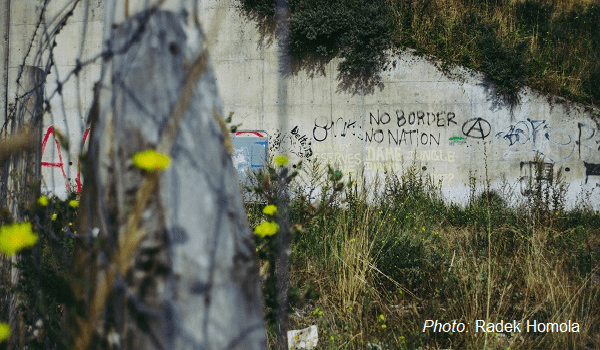At the end of a 37-day hunger strike calling for a moratorium on evictions over the winter, mass clearances of makeshift camps in Calais continue. In response to ever-increasing pressure from the UK to take draconian measures to block Channel journeys, the French minister has pointed the finger at British NGOs supplying aid. A reception crisis is unfolding in Briançon as the state fails to provide accommodation after the temporary closure of a volunteer-run facility.
Protestors engaged in a 37-day hunger strike called for authorities to address the constant threat of eviction suffered by migrants living in makeshift camps around Calais and Dunkirk. After authorities entered into mediation with the strikers, new facilities – including a new reception centre with 300 beds – were opened to house 800 people a night. The strike ended on 17 November when the activists’ extricated an agreement from the government to end all unannounced evictions and establish a dialogue between NGOs, people on the move, and the state. Nevertheless, the activists’ key demand, that of a 5-month moratorium on evictions during the cold months, went ignored. Even the promise on unannounced evictions seemed to be ignored on 16 November when police forcibly cleared 1,500 people from a camp in Grande-Synthe without warning. Another eviction of 300 people took place in Dunkirk on the same day. While the government insisted the people were accommodated, NGOs point out that over the last 12 months, only 1% of people evicted benefited from a stable housing solution, and only 12% received temporary housing. Utopia 56, a pro-migrant alliance, describes the policy as ineffective, saying that those seeking to reach the UK are not deterred from returning to the coast after being placed in centres elsewhere. In the year prior to 31 October 2021, 1,330 evictions by the state were recorded across France, equating to the daily eviction of 472 people on average. In 71% of the clearances, peoples’ belongings were destroyed or confiscated.
France’s hard-line response to people on the move is in part a response to intense pressure from UK officials to take a “tougher” approach to sea departures. A Downing Street spokesperson said France must “do more to prevent [Channel] crossings, which are putting lives at risk” after a daily record number of 1,185 people arrived on 11 November in 33 boats. At least ten people are recorded as having died in the past three weeks while attempting to make the 34km journey across the busiest shipping lane in the world. In response to UK claims that French police aren’t “doing enough”, interior minister Gérald Darmanin said “NGOs preventing police from working are mostly British NGOs”. According to Darmanin the police had been effective in breaking up a smuggling ring and arresting 13 people. The French government has previously accused the British of not providing enough support, and this week a parliamentary working group found that the UK contributes only 20% of the cost of securing the Calais coastline. NGOs meanwhile refute that they obstruct the police, and instead claim French police obstruct their aid delivery, including by blocking off camps with boulders.
A reception crisis has unfolded on the border with Italy after an over-crowded volunteer-run refuge in Briançon closed to new arrivals on 24 October. During 2021, the town has seen up to 60 new arrivals each day needing accommodation, often because they cannot continue their journey without a Covid-19 vaccination pass. After migrants occupied the local train station for two nights, the local church parish stepped in to provide accommodation. On the Italian side of the border, the squats that have hosted people have been repeatedly evicted. Activists are demanding the immediate establishment of quality, state-funded and run reception facilities. The dangers present for people transiting through this region were demonstrated once again when the decomposing body of a man who had been crossing the Italian-French border was found under a bridge.
A parliamentary report released this week decried the poor living conditions and lack of access to basic rights for migrants and asylum seekers in France. The report denounces “systemic failings” in French migration policy, and points out that much of the French population are recently arrived, foreign-born or have migrant heritage. “In France, people are drowning in the Channel, are hypothermic in Briançon, and yet we only talk about security issues and the migratory threat”, said Sébastien Nadot, the MP presenting the report. Mr Nadot and other MPs said current policy dehumanises people who seek to be part of French society. Solidarity marches in support of activists and people on the move took place on 13 November in Briançon and Calais.
For further information:
- ECRE, Channel: Lack of Regular Routes Drives Dangerous Journeys, Deaths at Sea Generate Resistance to Pushbacks from Border Force, Hunger Strike in Calais Continues, November 2021
- ECRE, Channel: Spat over Funding Continues Despite Thousands of Interceptions, Protests in Calais over Evictions, UK Failure on Housing and Mental Health, Home Office Spends Three Million GBP on Unused Centre, October 2021
Photo by Radek Homola on Unsplash.
This article appeared in the ECRE Weekly Bulletin. You can subscribe to the Weekly Bulletin here.

